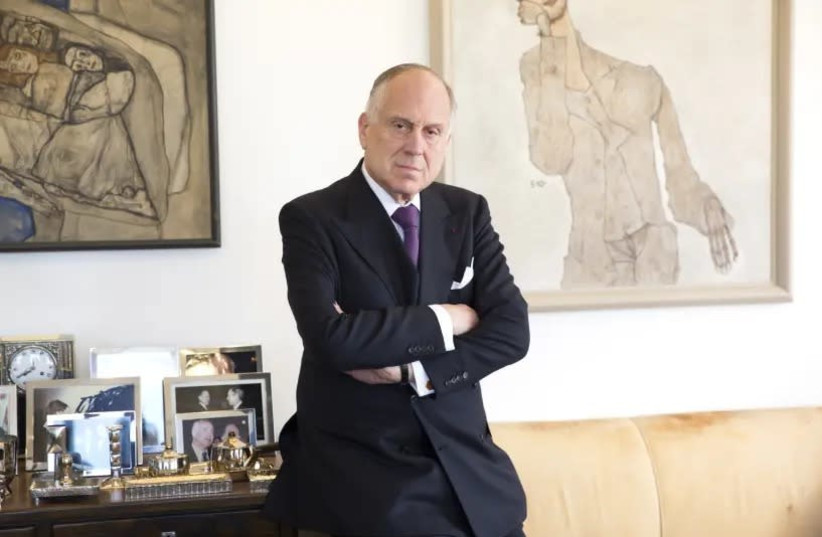The World Jewish Congress hosted Dr. Andor Grosz in Israel on Tuesday following his election as President of the Federation of Hungarian Jewish Communities.
Andor Grosz was born in Gyor, Hungary in 1951 after the war. He was raised Jewish with a strong connection to his Judaism, traditions, and customs.
At the time, most Hungarian Jews had been deported due to the Holocaust. There were around 5,000 Jews deported from Gyor. Grosz had 50 family members who died in the Holocaust, with only his father surviving.
Grosz moved to Budapest in 2007 and has lived there since. He has two daughters who he also raised Jewish including religious customs, Shabbat, and traditional Jewish holidays. He shares that they both had Bat Mitzvahs.
On May 14, Grosz was elected as President by the general assembly of the Federation and will serve a four-year term. The Federation of Hungarian Jewish Communities caters mainly to Neolog Jewry, which was formed in the 19th century in Hungary. Neolog Judaism can be described as the liberal, modernist trend of Judaism that accounts for the majority of Hungarian Jews and is which in practice is akin to the Conservative/Masorti Jewish movement.

Neolog Jewry encompasses the largest population of religious Jews in Hungary, however, most Jews in Hungary are Secular. The Federation also caters to those who aren’t as religious and prefer to practice their Judaism more culturally.
Grosz shares that his main goal upon election is to strengthen religious characteristics of the Jewish community in Hungary and work on outreach to Jews in Hungary so they can be connected to Israel religiously and culturally.
“The first step is to close our people inside and make peace inside the community,” Grosz said. “To create a constructive and nice way of thinking in the community and towards everyone.”
There are two other religious institutions in Hungary: Chabad and Orthodox
Grosz expressed that he also wants a peaceful connection between different practices of Judaism in Hungary.
“I want a normalization of connection and mutual respect towards each other,” Grosz said.
Maram Stern, Brussels-based Executive Vice President of the World Jewish Congress, the international Jewish organization's most senior leader, said 'I am looking forward to working with Dr Grosz and the Federation of Jewish Communities to help ensure the wellbeing of Hungarian and European Jewry. His role takes on added importance as Hungary is poised to assume the mantle of the EU Presidency next year.'"
The Federation is currently working towards community building and Jewish education. There is a framework of Jewish education from kindergarten to university in Hungary and they are strengthening infrastructural development within the education.
Grosz and the Federation are also striving for a positive relationship with the government. He said that in prior years there have been differences between themselves and the government.
“I think it should be solved in a respectful and mutual way,” Grosz said. “We should normalize Jews and the government.”
In Hungary, there is zero tolerance for hate speech and antisemitism. However, even though the government currently supports Jewish and religious institutions, there are still hidden figures of antisemitism within Hungarian society.
Another goal of the Federation is to strengthen its relationship with the Jewish part of Israel. They want to connect Israel Jewish society and Hungary.
Growing up, Grosz had different perspectives of Israel. While studying in the Soviet Union he had Jewish friends and schoolmates and said he heard very different things from them versus what was in the media.
It was also the start of a big Aliyah movement. Grosz said there were two faces of politics in the Soviet Union with one side pushing for equality and the other side not.
“I understood Jewish friends who felt they couldn't stay and chose other countries to escape the reality,” Grosz said.
The Federation is currently working on the reconstruction of a hospital and education within the university and amongst Jewish youth. They are also planning to construct two synagogues in the coming years. The State of Hungary promised they would help and the community will support them as well.
“Many community programs and projects we want to support need a lot of money and financial support to continue,” Grosz said. “We got it from the state and need to make sure that the state will continue to support us.”
They also want new programs for all ages, to reach out to younger generations and students, culture and education in these fields, and want to integrate Jews in the countryside - not just Budapest.
Grosz will reach these goals with the interest of the Hungarian Jewish community at heart. He wants to take the interest of all sides into account and come to mutual agreements within his role. Grosz has the support of his family and 70% of the community behind him in these decisions.
“I did everything in my career and now I feel that my goal is to stop this tension inside the Jewish community and with the government,” Grosz said. “I have to help my Jewish people so they can live in peace in the country.”
